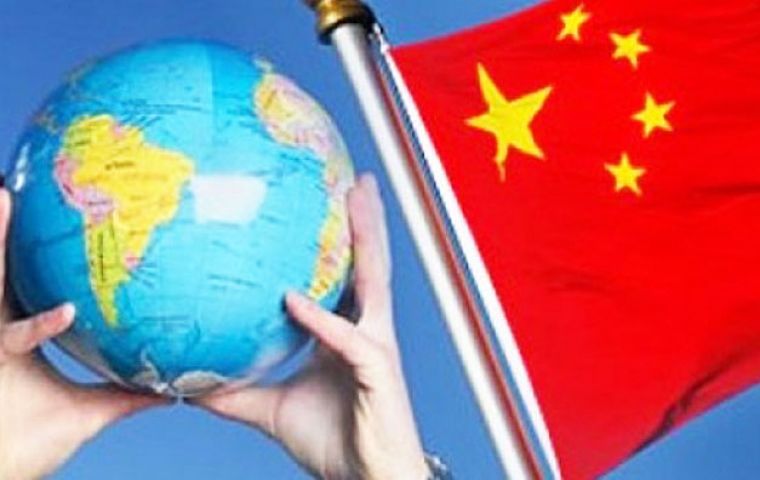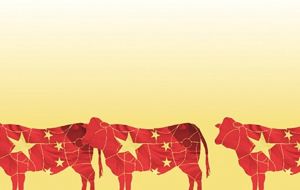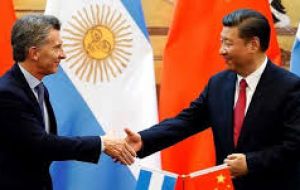MercoPress. South Atlantic News Agency
Could China end going to the rescue of crisis-prone Argentina?
 “China’s relationship with Latin America has been developing for the last 10 years, so it is not a farfetched thought”
“China’s relationship with Latin America has been developing for the last 10 years, so it is not a farfetched thought”  China is interested in ensuring farm supplies and Argentina is the world’s top supplier of soymeal livestock feed and third-largest corn and soybean exporter
China is interested in ensuring farm supplies and Argentina is the world’s top supplier of soymeal livestock feed and third-largest corn and soybean exporter  IMF concluded that Argentina’s rising public debts had become “unsustainable,” warning private creditors to expect meaningful losses on their investments.
IMF concluded that Argentina’s rising public debts had become “unsustainable,” warning private creditors to expect meaningful losses on their investments.  Less than a year earlier, Macri and Xi Jinping had agreed to bolster economic ties between the two countries in areas such as trade, investment and infrastructure.
Less than a year earlier, Macri and Xi Jinping had agreed to bolster economic ties between the two countries in areas such as trade, investment and infrastructure. Argentina is thought to be on the brink of falling into its ninth sovereign default, prompting some analysts to speculate whether the crisis-prone South American country might be tempted to accept funding from China.
The intensifying risk of default comes as Latin America’s third-largest economy struggles to recover from a painful recession, rampant inflation and a stock market rout late last year.
“Could China provide the funding? This is certainly not a base case, but it is in the back of people’s minds,” Jimena Blanco, head of Latin America at Verisk Maplecroft admitted.
“China’s relationship with Latin America has been developing for the last 10 years, so it is not a farfetched thought. There is no reason why we should not foresee China providing the funding in exchange for commodities.”
She highlighted that agriculture would be the obvious choice for funding. Argentina is the world’s top supplier of soymeal livestock feed and third-largest corn and soybean exporter, according to Reuters.
Last Wednesday, Argentina’s government wrapped up a week-long talks with the IMF), as it battles to restructure US$100 billion in debt, including US$44 billion to the fund.
The IMF concluded that Argentina’s rising public debts had become “unsustainable,” warning private creditors to expect meaningful losses on their investments.
The announcement appeared to lend support to Argentina’s government, which has vowed to reject the kind of fiscal austerity measures the IMF typically recommends to cash-strapped countries seeking loans.
Speaking from Buenos Aires, Verisk Maplecroft’s Blanco said financial markets had “already seen surprise after surprise” from the Peronist coalition of President Alberto Fernandez and Vice-President Cristina Fernandez de Kirchner.
She referenced de Kirchner’s unexpected decision to ask her former cabinet chief to run for the presidency last May as one example, while the administration’s selection of Martin Guzman, one of Nobel Prize Joseph Stiglitz preferred pupils, as finance minister in December was another surprise move.
As such, turning to China would not necessarily be a shock. In September last year, Buenos Aires announced it had secured long-sought approval from China to export soy-meal to the world’s biggest consumer of livestock feed.
It was widely seen as a breakthrough for Argentina with the deal announced amid heightened trade tensions between Washington and Beijing.
Mauricio Macri, Argentina’s president at the time, hailed the agricultural agreement as “historic,” promising the move would deliver “more labor, more work in agribusiness and more opportunities for Argentines.”
Less than a year earlier, Macri and Chinese President Xi Jinping had agreed to bolster economic ties between the two countries in areas such as trade, investment and infrastructure.
Fiona Mackie, regional director for Latin America at the Economist Intelligence Unit (EIU) said that part of the reason China had been mentioned as a possible wildcard for Argentina was because it wasn’t feasible for the country “to go it alone without the IMF.”
Mackie said Fernandez’s administration had been “posturing” by taking a firm stance with the IMF, before adding the administration “is not getting money from elsewhere.”
Argentina is hoping to complete debt negotiations with creditors by the end of March, but analysts have cautioned that this timeline looks “optimistic” while assigning a high risk of default before year-end.




Top Comments
Disclaimer & comment rules-

-

-

Read all commentsIt's nothing short of perplexing that Argentina's possible trade options with China would deserve such a headline.
Feb 23rd, 2020 - 04:13 am +1Firstly, Argentina has already been trading with China for some time now.
During CFK's second term, “Argentina signed 20 cooperation treaties and agreed a number of finance packages for Chinese-built infrastructure projects, including a controversial nuclear complex and two major dams,” notes dialogochino.net.
“Macri expressed concern over the deals, although he ultimately declined to cancel them,” the same article reads.
Secondly, it's difficult to imagine why this could surprise anyone considering that each country should be free to get partners as it wishes. Or isn't?
Since becoming Argentina's president, Alberto Fernandez has demonstrated ability to engage even the less likely interlocutors -- by doing so, he demonstrated understanding that he is governing for all Argentines -- not only those who voted for him, and he has also considered that his electoral victory was reached by building a front -- not just a homogeneous party.
They're talking about loans, not trade. China likes to give loans with natural resources as collateral, which might not be something Argentina wants to risk. But beggars can't be choosers...
Feb 23rd, 2020 - 10:44 pm 0I think trade is part of the equation, as China is the main buyer of Argentine soybeans while “Argentina is one of China's main trading partners in South America...”
Feb 24th, 2020 - 02:06 am 0And while former president Macri was initially wary of dealing with China, he soon became more pragmatic and agreed with Chinese President Xi Jinping “to bolster economic ties between the two countries in areas such as trade, investment and infrastructure.”
However, I agree with your point: Argentina must keep its eggs in several baskets and should not allow a single country to have too dominant a position. This would prevent Argentina from being a beggar unable to make choices.
Commenting for this story is now closed.
If you have a Facebook account, become a fan and comment on our Facebook Page!